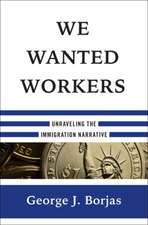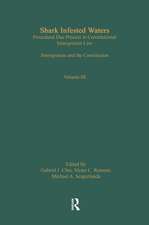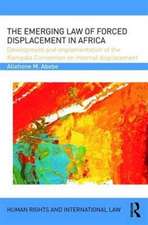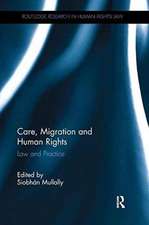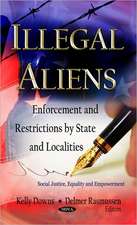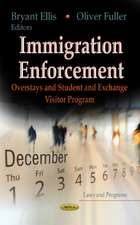Everyday Law for Immigrants
Autor Victor C. Romeroen Limba Engleză Paperback – 30 iun 2009
| Toate formatele și edițiile | Preț | Express |
|---|---|---|
| Paperback (1) | 294.77 lei 6-8 săpt. | |
| Taylor & Francis – 30 iun 2009 | 294.77 lei 6-8 săpt. | |
| Hardback (1) | 875.55 lei 6-8 săpt. | |
| Taylor & Francis – 30 dec 2008 | 875.55 lei 6-8 săpt. |
Preț: 294.77 lei
Preț vechi: 339.16 lei
-13% Nou
Puncte Express: 442
Preț estimativ în valută:
56.40€ • 59.05$ • 46.67£
56.40€ • 59.05$ • 46.67£
Carte tipărită la comandă
Livrare economică 05-19 aprilie
Preluare comenzi: 021 569.72.76
Specificații
ISBN-13: 9781594516283
ISBN-10: 1594516286
Pagini: 160
Dimensiuni: 152 x 229 x 8 mm
Greutate: 0.23 kg
Ediția:1
Editura: Taylor & Francis
Colecția Routledge
Locul publicării:Oxford, United Kingdom
ISBN-10: 1594516286
Pagini: 160
Dimensiuni: 152 x 229 x 8 mm
Greutate: 0.23 kg
Ediția:1
Editura: Taylor & Francis
Colecția Routledge
Locul publicării:Oxford, United Kingdom
Recenzii
"This book succeeds in clarifying the convoluted structure of U. S. immigration law. Additionally, it provides a concise, easy-to-read overview of the basics of U. S. immigration procedure. Recommended.”
—CHOICE
“This book has the rare combination of being both brief and well-stocked with good information on the subject of immigration law. The writing is accessible for non-lawyers, very nicely focused, and the book answers the most important questions about current immigration law.”
—Ronald Schmidt, Sr., Professor of Political Science at California State University, Long Beach, and author of Language Policy and Identity Politics in the United States
“A highly respected immigration law scholar has managed to take a hopelessly convoluted set of laws and policies and explain them in plain English without being simplistic or one sided. Romero’s book will be invaluable for anyone who is personally caught up in the U.S. immigration process and for anyone else who just wants a basic understanding of this volatile subject.”
—Stephen H. Legomsky, Washington University School of Law
"Described by leading scholars as intricate, 'hopelessly convoluted,''byzantine,' or even a 'hideous creature,' immigration law is a conundrum of a sort-very difficult to teach to law students, let alone explain to the ordinary migrant new to the American legal system. ...In his book, Everyday Law for Immigrants, Professor Victor Romero breaks this 'hideous creature' down into its most basic cells with astounding efficiency and care to provide the ordinary person with the essentials of how immigration status is acquired, maintained, and lost. The book is quite remarkable. It not only presents complex materials in plain and understandable language, but also employs a creative analogy between immigration law and contracts to help the reader gain a better understanding of immigration law. Throughout the book, Professor Romero masterfully demonstrates, for the benefit of those who make and interpret the law, the needlessness of immigration law's complexity. As such, it is an extraordinary success in simplifying complex materials in the tradition of the Everyday Law series-as attested to by the editors of the series, Professors Richard Delgado and Jean Stefancic-and in guiding the efforts of lawmakers and the judiciary to simplify the puzzle that is immigration law."
-Seattle University Law Review
—CHOICE
“This book has the rare combination of being both brief and well-stocked with good information on the subject of immigration law. The writing is accessible for non-lawyers, very nicely focused, and the book answers the most important questions about current immigration law.”
—Ronald Schmidt, Sr., Professor of Political Science at California State University, Long Beach, and author of Language Policy and Identity Politics in the United States
“A highly respected immigration law scholar has managed to take a hopelessly convoluted set of laws and policies and explain them in plain English without being simplistic or one sided. Romero’s book will be invaluable for anyone who is personally caught up in the U.S. immigration process and for anyone else who just wants a basic understanding of this volatile subject.”
—Stephen H. Legomsky, Washington University School of Law
"Described by leading scholars as intricate, 'hopelessly convoluted,''byzantine,' or even a 'hideous creature,' immigration law is a conundrum of a sort-very difficult to teach to law students, let alone explain to the ordinary migrant new to the American legal system. ...In his book, Everyday Law for Immigrants, Professor Victor Romero breaks this 'hideous creature' down into its most basic cells with astounding efficiency and care to provide the ordinary person with the essentials of how immigration status is acquired, maintained, and lost. The book is quite remarkable. It not only presents complex materials in plain and understandable language, but also employs a creative analogy between immigration law and contracts to help the reader gain a better understanding of immigration law. Throughout the book, Professor Romero masterfully demonstrates, for the benefit of those who make and interpret the law, the needlessness of immigration law's complexity. As such, it is an extraordinary success in simplifying complex materials in the tradition of the Everyday Law series-as attested to by the editors of the series, Professors Richard Delgado and Jean Stefancic-and in guiding the efforts of lawmakers and the judiciary to simplify the puzzle that is immigration law."
-Seattle University Law Review
Cuprins
Introduction; Chapter 1 Overview and History of U.S. Immigration Law; Chapter 2 Immigration Law Basics; Chapter 3 Immigration Procedure Basics; Chapter 4 Alienage Laws and Contemporary Immigrant Issues Post-9/11; Chapter 5 Selected Bibliography and Resource Guide;
Descriere
Immigration is one of the most controversial topics. Citizens and pundits from across the political spectrum argue for major and disparate changes to American immigration law. This guide is suitable for US citizens who want a better understanding of our immigration laws as well as for migrants who make the United States their home.


